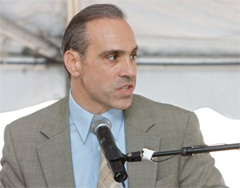Last week's release of "before" and "after" stats on the Prospect Park West bike lane tells an increasingly familiar story: A DOT redesign has increased cycling while making the street safer for pedestrians and drivers. Since safer streets make it easier for New Yorkers to get around without a car, and since biking and walking are emissions-free modes, it's safe to say that this is good news for the environment.

Well, City Council Member James Oddo begs to differ.
The Post reports that Oddo and fellow Staten Island rep Vincent Ignizio want to require time-consuming environmental reviews for future NYC bike projects:
Staten Island Councilman James Oddo, the Republican minority leader, said plans for new bike lanes should undergo the city's lengthy environmental-assessment process, or the city should allow other, more minor traffic changes to bypass the review.
Oddo and Councilman Vincent Ignizio (R-SI) penned a letter last week demanding an explanation from Deputy Mayor Stephen Goldsmith and Transportation Commissioner Janette Sadik-Khan, an avid cyclist and bike-lane proponent, of why the lanes don't require the scrutiny.
"The creation of bike lanes and the removal of vehicle travel lanes represent a major reordering of Department of Transportation priorities that may affect the environment and appear to qualify" for a formal environmental review, the letter reads.
Oddo was part of the team that successfully lobbied to kill the Father Capodanno bike lane late last year. The city erased that decades-old cycling route -- in what you might call a "major reordering" of the street -- without any public hearing or environmental review. Now, under the guise of environmental review, Oddo and Ignizio want to throw more monkey wrenches at bike projects.
We'll have more on Oddo's ideas about environmental review in a future post. What's more notable than this single proposal is the pattern that's emerging: Several City Council members seem intent on making their body a stagnant backwater for transportation policy, whose main purpose is to restrain New York from making streets safer.
In other American cities -- places that are less transit-friendly or walkable than NYC -- council members have spoken up for progressive transportation policies like setting parking meter rates according to parking demand. San Francisco's David Chiu recently said that expanding his city's bike network was his number one transportation priority.
NYC has some bright representatives when it comes to transportation and street safety, but overall, our City Council members need to brush up on the issues, spend less time pandering with frivolous parking giveaways, and get serious about transportation policy that will actually help their constituents.





